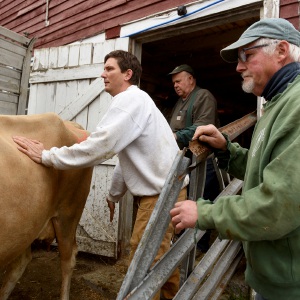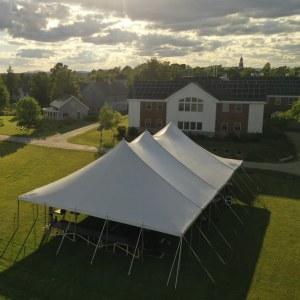Few people have made their way to state’s last-minute temporary shelters
| Published: 03-19-2024 4:26 PM |
Last week, Gov. Phil Scott’s administration scrambled to set up four mass shelters within a matter of days, anticipating hundreds of people would lose their eligibility for state-subsidized rooms through Vermont’s motel housing program on Friday.
Yet over the weekend, a tiny fraction of the beds set up by the state were put to use. At one shelter, not a single person showed up.
The temporary shelter at 108 Cherry Street in Burlington saw the most use, according to emails from state officials to lawmakers and local leaders shared with VTDigger/Vermont Public. Ten people stayed there on Sunday night, seven on Saturday, and three on Friday. The shelter at the former Health Department office building had space for 100 individuals.
Other shelters across the state saw even less uptake.
The Agency of Natural Resources Annex building in Berlin, set up to accommodate 100 people, hosted just one person on Saturday; no one showed up on either Friday or Sunday night.
And at the Vermont Yankee administrative building in Brattleboro — a site the state only announced it would use as temporary shelter on Friday morning – nobody came.
According to a Friday press release from the Department for Children and Families, National Guard members, medical professionals, and security personnel were staffing each of the shelter sites, which are all in recently converted buildings owned by the state.
The Scott administration’s slapdash rollout of the temporary shelters was marked by last-minute notice to the municipalities hosting them and a lack of communication with unhoused Vermonters exiting the motel program.
Article continues after...
Yesterday's Most Read Articles
 Herd departs Hartford’s last remaining dairy farm
Herd departs Hartford’s last remaining dairy farm
 Kenyon: What makes Dartmouth different?
Kenyon: What makes Dartmouth different?
 At Dartmouth, hundreds protest ongoing war in Gaza and express support for academic freedom
At Dartmouth, hundreds protest ongoing war in Gaza and express support for academic freedom
 Editorial: Parker parole a reminder of how violence reshapes our lives
Editorial: Parker parole a reminder of how violence reshapes our lives
 A Life: Richard Fabrizio ‘was not getting rich but was doing something that made him happy’
A Life: Richard Fabrizio ‘was not getting rich but was doing something that made him happy’
“There was no systematic way of even informing people that there was such a shelter,” said Rick DeAngelis, co-executive director of Good Samaritan Haven, a shelter provider in Washington County.
DeAngelis and other service providers and advocates spent Friday attempting to keep vulnerable Vermonters in the motel program by helping them fill out new disability waivers that could merit them a longer stay. On Friday, people who received a voucher through the program’s winter-weather eligibility needed to prove they had a qualifying vulnerability in order to hang onto their rooms for a few more months.
In Washington County, DeAngelis said his team’s scrappy efforts helped “at least half” of the roughly 60 individuals slated to leave the program on Friday to remain in their rooms, at least for now. That intervention likely contributed to the low turnout at the state-run Berlin shelter, he said.
Yet DeAngelis also pointed to other factors beyond just need, including the lack of transportation options for unhoused Vermonters to reach the remote location on Junction Road.
“There were no shuttle buses running out there, so they had to figure it out on their own,” DeAngelis said.
Others pointed to the lack of essential services provided at the temporary shelter locations.
“The fact that these hastily assembled shelters that do not meet even basic needs, like showers, have not been heavily utilized does not surprise us,” said Samantha Sheehan, communications director for Burlington Mayor Miro Weinberger. “The low usage of these emergency shelters is a reflection of how they are being operated, not of the need for shelter.”
It’s unclear exactly how much longer the temporary state shelters will remain open. On Friday, the Department for Children and Families said they’d be in operation “for up to seven days,” but officials didn’t respond to a request for an update on Monday. The shelters are open from 7 p.m. to 7 a.m., although guests need to arrive before 11 p.m. “and should have minimal personal items,” according to the release. Weapons and substance use are prohibited, and service animals are welcome.
Anne Sosin, a public health researcher at Dartmouth College who studies homelessness, hesitated to even describe the state’s temporary locations as “shelters.”
“Shelter implies a minimum standard,” Sosin said, including essentials like showers and storage options. “The administration is putting up warehouses, not shelters.”
This story, by Report for America corps member Carly Berlin, was produced through a partnership between VtDigger and Vermont Public.

 Big drop in tuition and aid is boosting Colby-Sawyer
Big drop in tuition and aid is boosting Colby-Sawyer  How NH Education Commissioner Frank Edelblut used his office in the culture war
How NH Education Commissioner Frank Edelblut used his office in the culture war
